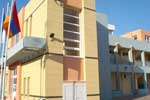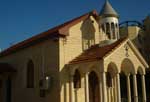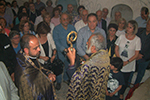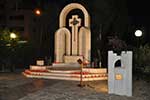Η Στήλη του Σασσουνιαν

Prime Minister’s 1919 Letter Describes Armenia as Destitute, Yet Full of Hope
Today, at a time of global economic crisis, conflict and wars, most people are justifiably discouraged and depressed by the deluge of bad news. Armenia and Armenians are no exception.
At the outset of the year 2010, as Armenians assess their own situation, it is instructive to look back at the appalling conditions in the newly-born Republic of Armenia (1918-20). The stark difference -- along with some similarities -- between life in Armenia today and the first Republic becomes clear as we read the poignant letter of Armenia's first Prime Minister Hovhannes Katchaznouni sent to his wife in Tbilisi, Georgia, in January 1919.
The letter was written shortly after Armenia gained independence, as destitute Armenian survivors of the Genocide, dying from starvation and disease, were exposed to freezing conditions without adequate clothing or shelter. Prime Minister's letter is a compelling document that contains valuable lessons for Armenians today. I have translated from the Armenian original excerpts from his lengthy letter.
Katchaznouni begins his letter by reflecting on his own troubled state of mind: "I see in front of my eyes the hundreds of thousands of people whose leadership has been entrusted to me. Remembering them, thinking of them, drives me to insanity with pain and sorrow."
The Prime Minister describes in agonizing detail, the miserable condition of his people as being "in abject poverty -- in the pangs of death. We have no bread to eat; we are starving. We have no shelter. Our villages are destroyed. We don't have a roof over our heads; living in collapsed buildings under harsh winter conditions. We have no clothes to wear. We are naked. We are freezing in tattered clothes. We are exhausted, sick and near death. Typhus fever has assumed unprecedented proportions. Two thousand out of Yerevan's 60,000 inhabitants are bed-ridden with typhus fever. Half of the doctors and nurses are either sick or dead. We have no disinfectants; no fuel to heat up the public baths to bathe the people and rid them of lice; and no soap to do the wash. We have no money. Our [printed] money was confiscated by Georgians in Tbilisi. We have no means of communication. The railroad is destroyed.... We have no horse-driven carriages, as the horses have died of starvation, and we have slaughtered the oxen for their meat."
Facing abject misery, Katchaznouni believes that Armenians were able to survive only due to their unlimited ability to endure against all odds: "Our troops who chased out the Georgians in Lori are naked and hungry. We have more than 10,000 orphans in state orphanages with no money to feed them. We have 300,000 homeless refugees who are dying in front of our very eyes and we can't do anything about it. State offices are not functioning, as we have no means of payment. Adding to this misery, we are afflicted with corruption, theft, pilfering, robbery, and blackmail -- against which we have no recourse."
He goes on to describe the complications resulting from clashes with Georgians and Turks. He states that "while Armenia is trying to avoid war at all cost, we cannot make concessions to everyone, to yield, to be patient and retreat, because by doing so we endanger greatly the future of our state, our political situation, our independence, our freedom -- everything for which we made such terrible sacrifices, expended superhuman efforts, and survived for generations and centuries. Yet, we are exhausted to such a degree that we are unable to continue to fight, to resist, to endure, and make new sacrifices.... Meanwhile, outside help from the United States and England, on which we placed all of our hopes, is slow and inadequate."
The Prime Minister next complains about the "lack of talent and inexperience" of government officials, including his own, and laments "internal discord, lack of trust, antagonism, and even mutual hatred." He describes the weaknesses of each cabinet minister, even accusing one of seeking to enrich himself. Several of his ministers and top aides are either bed-ridden with serious illnesses or have left the country for short trips, but have not returned in weeks. He then turns in despair to the bankrupt status of his government: "The state coffers are empty. Our money is in the hands of the Georgians in Tbilisi. We need to care for the orphans, distribute bread to the hungry, cure the ill, and pay the staff... but how? I get dizzy just thinking about it!"
Before ending his letter, Katchaznouni consoles himself with the hope that "the dawn is near." He calls upon Armenians "to endure, pull together their last drop of energy, make a final effort, and remain on their feet," because "we have already sacrificed so much, lost so much blood, and shed so many tears. So many houses are in ruins. All of these sacrifices must receive their just compensation -- not so much for ourselves, but for our children. Perhaps another 10,000 will lose their lives, including my own, but at least those who survive will have normal lives, breathe freely, and live like human beings. That will come to pass -- shortly!"
Incredibly, despite overwhelming odds, Katchaznouni sees a bright future: "Just five years earlier, Armenia was a mere geographical term and a distant dream as a political unit that no one dared to speak about. Today, the Republic of Armenia is a reality. Let this Republic be tiny and poor. Let the people starve and suffer from epidemics. All these things are transitory. What we have is a proven fact. There is no power on earth that can erase from the pages of history this reality. After 500 years of slavery, a nation is reborn to live a free and independent life."
Armenia's first Prime Minister then proudly recounts the establishment of the Republic, expansion of its territory and withdrawal of Turkish troops. "Great powers have recognized Armenia and have included us in delegations for international conferences. Major countries have formal relations with us. They send us their representatives. They correspond with us, addressing us as ‘The Government of the Republic of Armenia, the President, the Foreign Minister.'"
While conditions in today's Armenia are incomparably better than they were in Katchanznouni's time -- after all, 90 years have passed since then -- the Armenian people surely deserve a higher standard of living. The majority still lacks the basic necessities.
Yet despite economic hardships and outside threats, Armenians' will to survive is engrained in their DNA! For several millennia, they have suffered occupation, plunder, wars, massacres, and even Genocide and have endured. Today's difficulties will also pass.... Armenians will not only survive, but also thrive!
By Harut Sassounian
Publisher, The California Courier
«« Επιστροφή ««




















